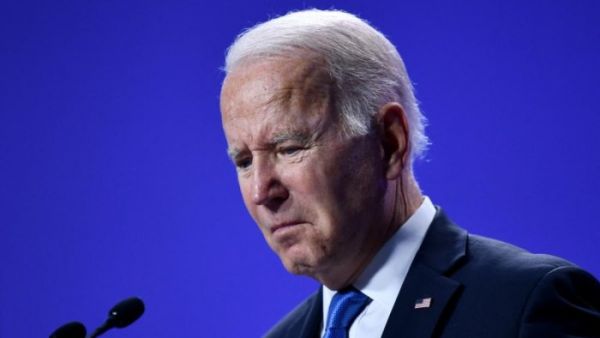ALBAWABA - Joe Biden in the Middle East. The American president says he is coming to the region to revamp US relations with different Arab states and especially to "reorient America’s strategic relations with Saudi Arabia."
He, at the head of a full-American team, will be in the Middle East for the first time since he become president between the 13 and 16 of July on a regional tour, starting Wednesday in Israel and the Palestinian territories and going on to Saudi Arabia on Friday to attend a GCC meeting in Jeddah where leaders of Jordan, Egypt and Iraq will also be attending.
In a guest op-ed published by The Washington Post late Saturday, Biden said he will travel to the Middle East to start “a new and more promising” chapter of America’s engagement there, he is quoted by Anadolu news as saying, adding this trip comes at a vital time for the region, and it will advance important American interests.
Biden's trip is getting much attention from the media with many surprised about him coming to Saudi Arabia especially since he made it clearly he is not pleased with Riyadh over its human rights record and the murder of Jamal Khashoggi in the Saudi Consulate in Istanbul.
But since then the world has changed. Russian invaded the Ukraine in early 2022 creating havoc in the international oil market and forcing prices to shoot upwards and as well many have long speculated that the Israelis are pressuring Biden to go to Saudi Arabia plead with Riyadh to formally normalize with Israel.
Analysts have since argued the American president is now coming to the region to try to push these two objectives together. He will plead with the Saudis to boost oil production in a bid to stabilize prices and he will call on the leadership to follow the Abraham Accord and the UAE, Bahrain, Sudan and Morocco and seal a deal with Tel Aviv. Relations between Israel and these states are going strong with military trade deals since the end of 2020 topping $3 billion and over 150 meetings.
For his part, Biden prefers to use his own words. “From the start, my aim was to reorient — but not rupture — relations with a country that’s been a strategic partner for 80 years. Today, Saudi Arabia has helped to restore unity among the six countries of Gulf Cooperation Council, has fully supported the truce in Yemen and is now working with my experts to help stabilize oil markets with other OPEC producers,” he said.
This morning I sat down with Israeli Prime Minister Lapid to sign a new strategic U.S.-Israel partnership based on a bedrock of shared values, our commitment to preserve and strengthen Israel's defense capabilities, and a true and enduring friendship. pic.twitter.com/Sk2T1GkzgZ
— President Biden (@POTUS) July 14, 2022
From what he is saying the Americans and the Saudis and Gulf states maybe working on the oil issue though outwardly Riyadh, and maybe Abu Dhabi as well as other Gulf states are very pleased oil prices are up, giving them more revenue sources to carry on their war with Yemen although factions there are still in the middle of a truce.
For Biden however, an increase in oil production would mean less pressure on the American economy because of lower prices at the oil pumps and wouldn't be so bad on the US consumer persuading them to vote for the Democrats in the US November elections. So in the end the international run around is domestic policy for the American president.
In this respect as well, Biden and his team are arguing a more secure and integrated Middle East benefits Americans in many ways and is making no secret of the fact, with him saying he will pursue diplomacy to the limit — including through face-to-face meetings — to achieve his goals.
“I know that there are many who disagree with my decision to travel to Saudi Arabia. My views on human rights are clear and long-standing, and fundamental freedoms are always on the agenda when I travel abroad, as they will be during this trip, just as they will be in Israel and the West Bank,” he is quoted by the Turkish news website as saying.
Many say his visit will help establish a normalizing trend with Saudi Arabia. He will be the first US president to fly from Israel to the Saudi port city of Jeddah, a point being stressed by many commentators. Although it should be pointed the Saudis, and despite the current more flexible approach, the Saudis have always said they will only normalize with Tel Aviv if the Israeli-Palestinian track moves forward. However, Biden has said this trip will also be “a small symbol of the budding relations” and “steps toward normalization between Israel and the Arab world.”
“Next week, I will be the first president to visit the Middle East since 9/11 without US troops engaged in a combat mission there. It’s my aim to keep it that way,” he added.
Arab leaders from across the region gather in Jeddah for a meeting of the Gulf Cooperation Council (GCC) countries plus Iraq, Jordan, and Egypt. This is seen as an auspicious occasion for America to play a vital leadership role.
“Of course, the region remains full of challenges: Iran’s nuclear program and support for proxy groups, the Syrian civil war, food security crises exacerbated by Russia’s war against Ukraine, terrorist groups still operating in a number of countries, political gridlock in Iraq, Libya and Lebanon, and human rights standards that remain behind much of the world. We must address all these issues,” Biden wrote in his piece and as quoted by Anadolu.







